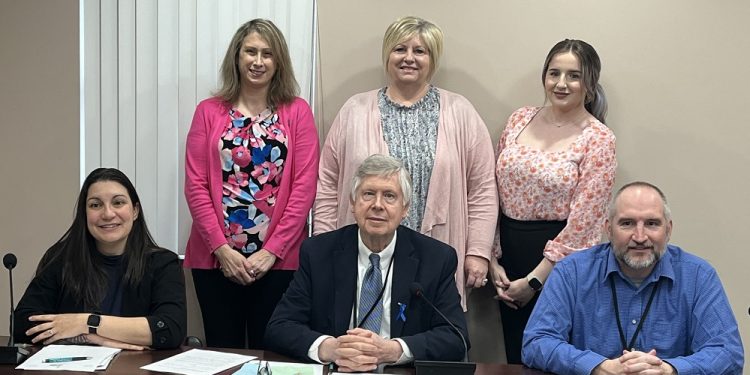CLEARFIELD – The Clearfield County Commissioners on Tuesday heard presentations on services available to victims of child abuse and sexual assault.
In the past, a report of child abuse meant the child may have to tell the story of abuse several times.
In these cases, it’s important that law enforcement, medical professionals, social workers and district attorney, know what happened.
The search for a better way led to the development of Child Advocacy Centers, according to a previously-published news release.
The Child Advocacy Center of Clearfield County (CAC-CC) is a “safe place” for children who may have been abused to tell their story, expressed Sierra Clark, case manager/forensic interviewer.
The center conducts forensic interviews of suspected child victims so they must only tell their story once while others involved with the case investigation watch from another room.
CACs are designed to be child-focused and reduce stress experienced by child survivors of abuse and their non-offending family members throughout the investigation and intervention process.
By focusing first on the needs of children and their families, CACs ensure that many important services are provided while improving the quality of investigations.
The services provided at the CAC-CC have grown since its establishment in 2016, stated Clark, and it served 225 children last year with over 200 being from Clearfield County.
So far this year, the center has served over 60 children, and according to Clark, case numbers steadily increase every year as more cases are being reported.
Currently the CAC-CC provides forensic interviews; on-site medical exams; referrals to services; advocacy; training/education in the community and so forth.
These vital services are possible through the commitment of the Multi-Disciplinary Investigative Team (MDIT), which includes representatives from the District Attorney’s Office, Children Youth & Family Services, law enforcement agencies throughout Clearfield County, medical personnel, CenClear, the Victim Witness Office, the Crossroads Project and Passages Inc.
The best way to report suspected cases of child abuse is ChildLine, which can be reached 24 hours a day, seven days a week by phone at 1-800-932-0313. Mandated reporters can report electronically.
You don’t have to know “every single” detail, stated Clark. “… They will always take your report no matter how little information you know.”
The county’s Child Advocacy Center works closely with other agencies, like Passages, which provides counseling and advocacy to victims of sexual assault.
The first Passages “office” was located on Clarion University’s campus (Clarion State College at the time and now PennWest-Clarion) in Harvey Hall.
It was the idea of Mary Ann (Roseman) Kernich and Teri (Drayer) Rhodes who, due to their jobs as a 911 communications operator and member of the campus security staff, had seen too many cases where individuals had nowhere to go for help after being assaulted.
Together they, along with a former Clarion State college student, Julie Copen coordinated a county awareness seminar to educate the community about sexual violence.
Following this seminar, they were convinced that a place for survivors to go for help was needed.
With the help of Karen Dupree from the college’s foundation office to help seek out a small amount of funding, Clarion County’s Rape Crisis center was born in 1980.
Passages expanded into Jefferson County in 1983 and into Clearfield County in 1998.
“We have nine staff members for three counties,” stated Marlene Austin, executive director, adding “our days are filled” with provision of services to children, adults and their loved ones affected by sexual assault.
She asked those present to jot down the name of one person who meant so very much to them, and to crumple up that piece of paper.
Then, she had them jot down the names of four females and six males they know.
Statistics estimate that one in four girls and one in six boys are sexually assaulted by age 18.
“Those are incredibly high numbers,” stated Austin. “We all know someone; they could be on your list. We just don’t know.”
And because most victims (over 90 percent) know their abuser, they struggle to disclose what’s happened to them.
“Sexual assault happens here in our rural communities,” stated Austin, noting Passages served 810 clients last year and estimates that number will be closer to 900 this year.
The center provides a 24-hour crisis hotline (1-800-793-3620); individual and group counseling to support and empower victims; legal advocacy; and prevention education programs.
Advocates support victims from start to finish—from the time of first disclosure clear through the criminal investigation, court system and even beyond.
Following the presentation, Austin asked those present to uncrumple their piece of paper so it appeared in its original form.
“When [sexual abuse] happens to a child, to an adult, they go through a lot,” she stated. “They need a lot of support, a lot of help.
“No matter how much they try to iron out those wrinkles, this is something that’s going to be with a survivor for the rest of their life.
“If it’s someone close, you’ll want to help them get those wrinkles out.”




